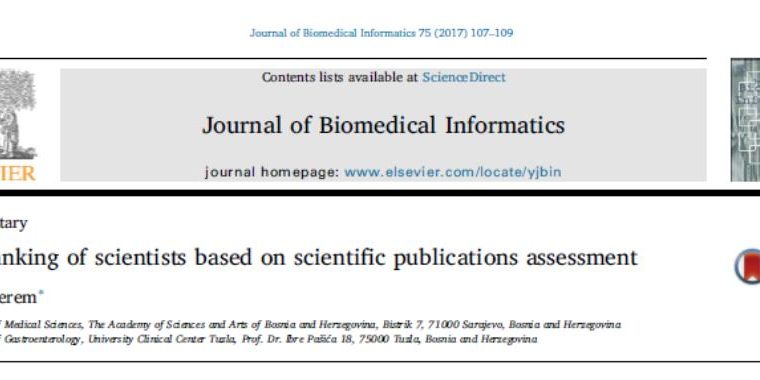An article under the title “The ranking of scientists based on scientific publications assessment” by Prof. Dr. Enver Zerem from the University of Tuzla has been published in the latest issue of Journal of Biomedical Informatics. The article shows the importance of applying internationally recognized criteria in the process of ranking scientists and evaluating their scientific output, and suggests improvements to so far relevant science metrics for evaluating the significance of scientists’ contribution.
The field of scientometrics deals with measuring of achievements in science and includes several disciplines. The most significant is the measurement of number and value of publication in scientific research. In the latest decades, many parameters have been introduced to measure both the productivity and citation impact of the publications of the scientists in the world. The most widespread approach includes the use of the h-index – the Hirsch index.
The Zerem- score or the Z- score is a new system of science measurement that significantly improves science metrics system that was used so far. At the same time, it should be noted that the Z- score is complementary to the previous metrics systems and can be applied as a correction.
This index takes the number of citations for all articles published by the author- scientist, as well as the evaluation of a new articles according to IF, and the total number of individual article citations. The Z- score also take into account the individual contribution of each author in an evaluated article.
The way of ranking scientists by assessing their scientific contribution objectifies and eliminates discrepancies in the process of ranking scientists when they apply for scientific and research grants and can be practically applied as a relevant measure in ranking of scientist for purposes of academic advancement.
In a recent scientometrics criteria, evaluation of scientific contribution of researches is mainly based on the number of citations of their published articles. That way of citation count favors older articles to the more recent articles of similar value, thus placing the young authors in an uneven position.
By calculating overall scientific score of an author (Z- score), the inequality in the assessment of the value between recent and previously published articles is eliminated to a great extent.
The significance of an article entitled ” Ranking of scientists based on scientific publication assessment” is best explained by the fact that the same issue of Journal also published special editorial dedicated to this article written by an esteemed Harward University Professor of bioinformatics Dr. David W. Bates. This is very important for the University Clinical Center Tuzla because the criteria published in a respected peer- reviewed academic journal are written by using the application of the scientometric parameters in the evaluation of scientific research and scientists at the University Clinical Center Tuzla.







